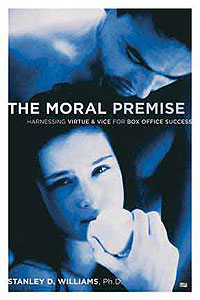
"The most powerful tool in my new tool box."
Will Smith
"A total game changer. The Moral Premise gets your story (and all your characters) working for you, instead of the other way around."
Michael Jann, Sr. Writer, Tonight Show with Jay Leno
"The Moral Premise dares to suggest that movies might actually mean something."
Chris Vogler, "The Writer's Journey"
"Thanks for the great book. I will recommend it to all my classes."
Blake Snyder, WGA, Author "Save the Cat"
"An incredibly practical and helpful tool that should be taught in every film school."
Marianne & Cormac Wibberley, WGA (National Treasure and National Treasure: Book of Secrets)
"Stan, You are a light and an incredible gift! Thank you for your insight and innovation.The Moral Premise: It's Amazing!"
DeVon Franklin, VP, Sony Entertainment
Author, "Produced by Faith."
"Should be required reading, retroactively, for every working Hollywood screenwriter."
Brian Bird, WGA, Producer
"Thank you, thank you, thank you for your wonderful Moral Premise, and for all you've done for me and my writing, Stan."
Tamera Alexander, Novelist
"This is really an important book."
Derek Rydall "The Script Doctor"
"Drop all of your 'to-do' lists, get this book, and curl up for the read of your screenwriting lifetime."
Dave Anderson, President, Compass Film Academy
Aspiring or working screenwriters - I have a tip for you. Buy the THE MORAL PREMISE by Stanley D. Williams and read it twice.
Paul Lalonde, Chairman, Cloud Ten Pictures
"More than a must-read; it is groundbreaking."
Curt LaLonde
More Endorsements >>
|
The Moral Premise
Harnessing Virtue and Vice for Box Office Success
by Stanley D. Williams, Ph.D.
Order Filled by

Nineveh's Crossing Product code: SW1-MPBK - $19.95
Autographed. In the comments field of the PayPal payment screens, or on a note otherwise, include the name you want Stan to sign the book to.
ORDER AUTOGRAPHED COPY ONE OF THREE WAYS:
- Use PayPal by clicking on the ADD TO CART button below. You will need either a PayPal Account, a Credit Card, or you can use a regular checking account but it takes a few days longer.
- Call 248-344-4423 with your credit card ready.
Product Details
- Paperback: 221 pages
- 10 pictures, Research Appendix
- Indexes: Films, Texts Cited, Topic, Moral Premise
- 16 tables, 6 figures, 105 footnotes
- Publisher: Michael Wiese Productions (2006)
- Language: English
- ISBN: 1-932907-13-0
SHORT DESCRIPTION OF BOOK
The Moral Premise describes how successful motion pictures are always structured around a psychological premise based on true moral values, and how screenwriters can appropriate the structural elements of the moral premise to write successful movies.
The moral premise is at the heart of all successful story telling from ancient history right up to the modern day. We find its controlling nature in the writings of Plato, the Bible, and Aesop. We find it in English Classics from Henry Fielding on...and in the many good stories of modern stage, movies, and television. Most respected writers on screenplays mention it, but they use a variety of confusing terms and never tell us how important it is...except Lajos Egri in his "The Art of Dramatic Writing."
But Egri's book is about stage plays and doesn't lay out for us, in practical terms, how to apply the moral premise to creation of a new work. In The Moral Premise I not only concentrate on motion pictures that dominate the American box office, but I provide a practical step-by-step approach to incorporating the moral premise and setting up a screenplays' structure for success.
While the physical, explicit story or plot line is what a movie is about, the psychological or moral premise is what the movie is "really" about. And the sooner a screenwriter and filmmaker understand its importance, and how it needs to be incorporated into every nook and cranny of a story, the faster the screenplay will get written, and the more successful the final film will be at the box office.
Although every successful screenwriter and filmmaker pays homage to the moral premise by ensuring the story is structured consistently and truthfully around it, there is no book that I am aware of that explains where the moral premise comes from, how it works, or how to apply it in new screenplays and films. Until now.
|





